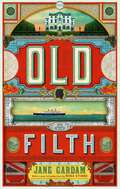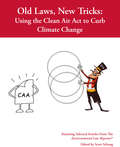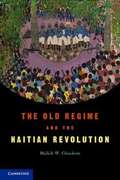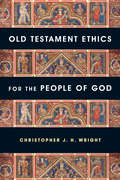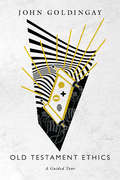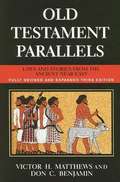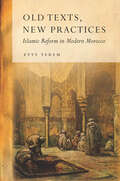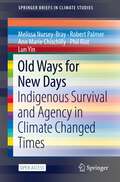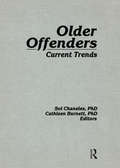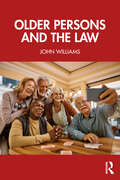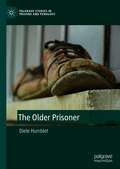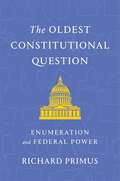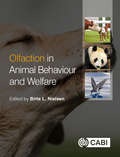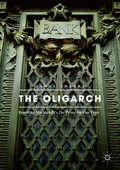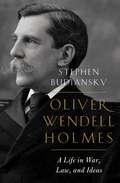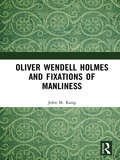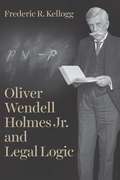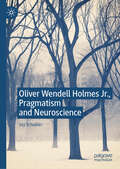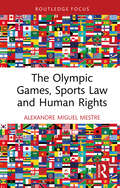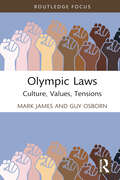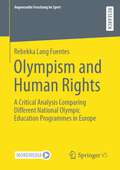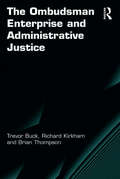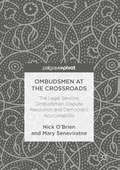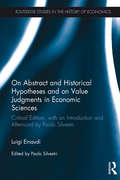- Table View
- List View
Old Filth: Shortlisted for the Women's Prize for Fiction (Old Filth Trilogy Ser. #3)
by Jane GardamJane Gardam's funny and wise masterpiece, reissued with a new introduction by Nina Stibbe'Old Filth has stayed with me for years' SATHNAM SANGHERA'Sharp, humane, generous and wonderfully funny' HILARY MANTEL'The last great book I read' RACHEL WEISZ 'Gardam's masterpiece'GUARDIANFilth, in his heydey, was an international lawyer with a practice in the Far East. Now, only the oldest QCs can remember that his nickname stood for Failed In London Try Hong Kong. Long ago, Old Filth was a Raj orphan - one of the many young children sent 'Home' from the East to be fostered and educated in England. Jane Gardam's novel tells his story, from his birth in what was then Malaya to the extremities of his old age. In doing so, she not only encapsulates a whole period from the glory days of the British Empire, through the Second World War, to the present and beyond, but also illuminates the complexities of the character known variously as Eddie, the Judge, Fevvers, Filth, Master of the Inner Temple, Teddy and Sir Edward Feathers.
Old Law, New Tricks: Using the Clean Air Act to Curb Climate Change
by Robert B. Mckinstry Jr. Brigham Daniels Timothy Profeta Robert A. Wyman Robert D. Brenner Franz Litz Marie Ly Anna Marie Wood Scott H. Segal Institute for Policy Integrity Nathan Richardson Brooks Rainey Pearson Nicholas Bianco Leila B. Azari Richard B. Herzog Arnold W. Reitze Jr. Claudine Schneider Davonne Flanagan Nicholas W. Fels Jonas Monast Charles H. Haake Patricia A. Eberwine Scott Schang Gary S. Guzy Kristin Igusky Meek The National Climate Coalition Timothy J. Mullins James Salzman Natural Resources Defense Council Art Fraas Emily Taylor John C. Dernbach John Doyle Thomas D. Peterson Dallas Burtraw Hannah Polikov Delavan Dickson Michael B. Gerrard Raymond B. Ludwiszewski David M. Driesen M. Rhead Enion Curtis A. Moore Rebecca Gasper Hannah ChangFew if any people think the Clean Air Act is the optimal legislative solution to climate change; but it is a powerful tool that is being used sometimes despite the prevailing political will. To address this reality, this volume calls on the best writing from the most often-cited environmental law journal in the United States, the Environmental Law Reporter®, to explain the possibilities and pitfalls in using this regulatory framework to address greenhouse gases (GHGs) and short-lived climate pollutants. This collection does not have a singular perspective or agenda other than to highlight multiple suggestions about ways in which the Act should or should not be used to address climate change. The Environmental Law Institute and editors of Environmental Law Reporter® do not endorse any approach outlined in these pages but instead present various ideas to educate and spur public debate and discussion.
The Old Regime and the Haitian Revolution
by Malick W. GhachemThe Haitian Revolution (1789-1804) was an epochal event that galvanized slaves and terrified planters throughout the Atlantic world. Rather than view this tumultuous period solely as a radical rupture with slavery, Malick W. Ghachem's innovative study shows that emancipation in Haiti was also a long-term product of its colonial legal history. The key to this interpretation lies in the Code Noir, the law that regulated master-slave relations in the French empire. The Code's rules for the freeing and punishment of slaves were at the center of intense eighteenth-century debates over the threats that masters, and not just freedmen and slaves, posed to the plantation order. Ghachem takes us deep into this volatile colonial past, digging beyond the letter of the law and vividly reenacting such episodes as the extraordinary prosecution of a master for torturing and killing his slaves. This book brings us face-to-face with the revolutionary invocation of Old Regime law by administrators seeking stability, but also by free people of color and slaves demanding citizenship and an end to brutality. The result is a subtle yet dramatic portrait of the strategic stakes of colonial governance in the land that would become Haiti.
Old Testament Ethics for the People of God
by Christopher J. H. WrightNothing confuses Christian ethics quite like the Old Testament. Some faithful readers struggle through its pages and conclude that they must obey its moral laws but may disregard its ceremonial and civil laws. Others abandon its teaching altogether in favor of a strictly New Testament ethic. Neither option, argues Chris Wright, gives the Old Testament its due. In this innovative approach to Old Testament ethics--fully revised, updated and expanded since its first appearance in 1983 as Living as the People of God (An Eye for an Eye in North America) and including material from Walking in the Ways of the Lord--Wright examines a theological, social and economic framework for Old Testament ethics. Then he explores a variety of themes in relation to contemporary issues: economics, the land and the poor; politics and a world of nations; law and justice; society and culture; and the way of the individual. This fresh, illuminating study provides a clear basis for a biblical ethic that is faithful to the God of both Testaments.
Old Testament Ethics: A Guided Tour
by John GoldingayWhat is ethics? Ethics is not merely about tricky situations or hot topics. Instead, ethics asks questions about what sort of people we are, how we think, what sort of things we do and don't do, and how we ought to live our everyday lives. How might we learn ethics from the Old Testament? Instead of searching for support for our positions or pointing out problems with certain passages, trusted guide John Goldingay urges us to let the Old Testament itself set the agenda. In this volume, readers will encounter what the Old Testament teaches about relationships, work, Sabbath, character, and more. Featuring Goldingay's own translation and discussion questions for group use, Old Testament Ethics: A Guided Tour is a resource for ethics like no other. Topically organized with short, stand-alone chapters, this book is one to keep close at hand.
Old Testament Parallels: Laws And Stories From The Ancient Near East, 3rd ed.
by Victor H. Matthews Don C. BenjaminA readable, portable anthology of ancient Near Eastern laws and stories that share parallel themes and issues with biblical stories. This third edition has been completely revised in light of the ongoing discoveries of more and more ancient Near Eastern texts and many of the parallels from the first two editions have been added.
Old Texts, New Practices: Islamic Reform in Modern Morocco
by Etty TeremIn 1910, al-Mahdi al-Wazzani, a prominent Moroccan Islamic scholar completed his massive compilation of Maliki fatwas. An eleven-volume set, it is the most extensive collection of fatwas written and published in the Arab Middle East during the late nineteenth and early twentieth centuries. Al-Wazzani's legal opinions addressed practical concerns and questions: What are the ethical and legal duties of Muslims residing under European rule? Is emigration from non-Muslim territory an absolute duty? Is it ethical for Muslim merchants to travel to Europe? Is it legal to consume European-manufactured goods? It was his expectation that these fatwas would help the Muslim community navigate the modern world. In considering al-Wazzani's work, this book explores the creative process of transforming Islamic law to guarantee the survival of a Muslim community in a changing world. It is the first study to treat Islamic revival and reform from discourses informed by the sociolegal concerns that shaped the daily lives of ordinary people. Etty Terem challenges conventional scholarship that presents Islamic tradition as inimical to modernity and, in so doing, provides a new framework for conceptualizing modern Islamic reform. Her innovative and insightful reorientation constructs the origins of modern Islam as firmly rooted in the messy complexity of everyday life.
Old Ways for New Days: Indigenous Survival and Agency in Climate Changed Times (SpringerBriefs in Climate Studies)
by Robert Palmer Melissa Nursey-Bray Ann Marie Chischilly Phil Rist Lun YinThis Open Access book provides a critical reflection into how indigenous cultures are attempting to adapt to climate change. Through detailed first-hand accounts, the book describes the unique challenges facing indigenous peoples in the context of climate change adaptation, governance, communication strategies, and institutional pressures. The book shows how current climate change terminologies and communication strategies often perpetuate the marginalisation of indigenous peoples and suggests that new approaches that prioritise Indigenous voices, agency and survival are required. The book first introduces readers to Indigenous peoples and their struggles related to climate change, describing the impacts of climate change on their everyday lives and the adaptation strategies currently undertaken to address them. These strategies are then detailed through case studies which focus on how Indigenous knowledge and practices have been used to respond to and cope with climate change in a variety of environments, including urban settings. The book discusses specific governance challenges facing Indigenous peoples, and presents new methods for engagement that will bridge existing communication gaps to ensure Indigenous peoples are central to the implementation of climate change adaptation measures. This book is intended for an audience of Indigenous peoples, adaptation practitioners, academics, students, policy makers and government workers.
Older Offenders: Current Trends
by Cathleen BurnettHere is the most up-to-the-minute interdisciplinary research that has been conducted on older offenders. This scholarly volume highlights the dimensions of the offenses committed by older adults and features empirical research addressing the sentencing alternatives applied to older offenders. Academicians and practitioners also provide much-needed insight into the management and correctional issues that arise with the incarceration of older offenders, including adjustment to prison life, physical and emotional health care, and rehabilitation and/or preparation of the offender for the return to life outside prison.
Older Persons and the Law
by John WilliamsThis book explores the law and legal system’s impact on older persons. As well as describing the current law primarily in England and in Wales, it highlights the pivotal role that elder law lawyers play in using law to challenge and combat ageism. Important questions are raised about whether the law perpetuates ageism and whether the current working of the law effectively challenges discrimination, abuse, and social exclusion faced by older persons.Elder law lawyers have an essential role in advocating for the rights of older persons. The book focuses on the need to uphold and respect the human rights of older persons, emphasising their dignity, autonomy, and right to inclusion. It examines key topics such as human rights in the context of ageing, the provision of social care, discrimination, decision-making capacities, mental health, and abuse and neglect. It also offers insights into the notion of personal liberty concerning older persons and whether existing safeguards are sufficient.The international dimensions of elder law are discussed, highlighting the range of initiatives led by the United Nations and efforts by non-governmental organisations and regional bodies. These initiatives aim to confront and diminish ageism on both international and domestic fronts, emphasising the need for a concerted effort to enforce the rights of older persons across different cultures and legal systems.This book will interest researchers, students, and practitioners specialising in family and social welfare law, elder law, human rights law, and discrimination law.
The Older Prisoner (Palgrave Studies in Prisons and Penology)
by Diete HumbletThis book critically explores the world of older prisoners to provide a more nuanced understanding of imprisonment at old age. Through an ethnographical study of male and female older prisoners in two Belgian prison settings, one in which older prisoners are integrated and one in which they are segregated, it informs debates and seeks to recognise ageist discourse, attitudes, practices in prison. The Older Prisoner seeks to situate the older prisoner from both a penological and gerontological perspective, organised around the following broad themes: the construction of the older prisoner, the physical prison world, the social prison world, surviving prison and giving meaning. The book allows readers to navigate between contrasting perspectives and voices rather than reinforcing traditional narratives and prevailing discourses on the older prisoner. In doing so, it hopes to open up a broader dialogue on ageing and punishment. It also offers insights into the concept of meaning in life as an analytical tool to study prisoners.
The Oldest Constitutional Question: Enumeration and Federal Power
by Richard PrimusA groundbreaking challenge to a core principle of constitutional law, arguing that congressional action is not limited by the legislative branch’s textually enumerated powers.Every law student learns that the federal government is constrained to act only according to its enumerated powers, meaning that Congress can do what the Constitution expressly authorizes it to and nothing more. Yet Richard Primus contends that this longstanding orthodoxy—allegedly required by the text of the Constitution, the Framers’ vision, and the logic of federalism—is fundamentally flawed.Through careful analysis of constitutional text and history, and of the structure of American federalism, The Oldest Constitutional Question builds a powerful argument for broad congressional authority. In particular, Primus shows that the primary function of enumeration is to rule listed powers in, not to rule other powers out. The Framers were more worried that the federal government might be fragile and anemic than that it would be overwhelmingly strong. Enumerating congressional powers is thus best understood as a way of ensuring that the federal legislature has an incontestable warrant to exercise the powers specified there, not as an exhaustive description of all that Congress can do.In practice, the enumeration of powers does little to limit Congress. But most constitutional lawyers—including many Supreme Court justices—think this means something has gone wrong, such that the courts must aggressively strike down federal laws exceeding Congress’s enumerated powers. Primus’s meticulous examination explodes the prevailing view, revealing its underlying errors. The constitutional system does place limits on Congress, and crucially so, but the enumeration of powers is not, and never has been, a sensible means for creating and enforcing those limits.
Olfaction in Animal Behaviour and Welfare
by Birte Lindstrøm NielsenEvidence-based, yet entirely practical, this important new text builds upon the basics of neuroscience to describe the links between olfaction and animal behaviour, and the effects of odours in animal welfare. Animals use smells in a multitude of ways: to orientate themselves, to create social bonds, to recognise food, to initiate reproduction, and to avoid predators and imminent threats such as fire. Starting from the scientific basis of olfaction and odour perception, the book covers pheromones and behavioural tests, before describing the role of olfaction in feeding behaviour, reproduction, disease detection, and animal housing. The book: #65533; is written in an evidence-based way, yet with an easy-to-understand style, making it accessible to non-experts #65533; focuses on animals managed by humans, i. e. farm, zoo, lab and companion species #65533; is illustrated by in-depth research examples of many different species This is a captivating introduction to the world of smells, suitable for advanced students, researchers, and teachers of applied ethology, animal welfare and veterinary science.
The Oligarch: Rewriting Machiavelli’s The Prince for Our Time
by James SherryThis book uses the structure of Machiavelli’s The Prince to show how governance has changed over the last 500 years. If Machiavelli focuses on power concentrated in the hands of the republic or principalities, The Oligarch looks at how states and companies today function as oligarchies. Rather than dealing with the form of government, it addresses the operations and networks of governance for both states and corporations as a single set of common processes. The author links politics, ecology and literature, by using the literary device of appropriation to raise awareness of ecology and the overreach of powerful people, offering both wielders and critics of power a common ground based on how people in power actually conduct themselves.
Oliver Wendell Holmes: A Life In War, Law, And Ideas
by Stephen BudianskyThe extraordinary story of the U.S. Supreme Court’s most influential justice. Oliver Wendell Holmes twice escaped death as a young Union officer in the Civil War when musket balls missed his heart and spinal cord by a fraction of an inch at the Battles of Ball’s Bluff and Antietam. He lived ever after with unwavering moral courage, unremitting scorn for dogma, and an insatiable intellectual curiosity. Named to the Supreme Court by Theodore Roosevelt at age sixty-one, he served for nearly three decades, writing a series of famous, eloquent, and often dissenting opinions that would prove prophetic in securing freedom of speech, protecting the rights of criminal defendants, and ending the Court’s reactionary resistance to social and economic reforms. As a pioneering legal scholar, Holmes revolutionized the understanding of common law by showing how the law always evolved to meet the changing needs of society. As an enthusiastic friend and indefatigable correspondent, he wrote thousands of personal letters brimming with humorous philosophical insights, trenchant comments on the current scene, and an abiding joy in fighting the good fight. Drawing on many previously unpublished letters and records, Stephen Budiansky’s definitive biography offers the fullest portrait yet of this pivotal American figure, whose zest for life, wit, and intellect left a profound legacy in law and Constitutional rights, and who was an inspiring example of how to lead a meaningful life in a world of uncertainty and upheaval.
Oliver Wendell Holmes and Fixations of Manliness
by John M. KangOliver Wendell Holmes, Jr. has been, and continues to be, praised as America’s greatest judge and he is widely considered to have done more than anyone else to breathe life into the Constitution’s right of free speech, probably the most crucial right for democracy. One indeed finds among professors of constitutional law and federal judges the widespread belief that the scope of the First Amendment owes much of its incredible expansion over the last sixty years to Holmes’s judicial dissents in Abrams and Gitlow. In this book, John M. Kang offers the novel thesis that Holmes’s dissenting opinions in Abrams and Gitlow drew in part from a normative worldview structured by an idiosyncratic manliness, a manliness which was itself rooted in physical courage. In making this argument, Kang seeks to show how Holmes’s justification for the right of speech was a bid to proffer a philosophical commentary about the demands of democracy.
Oliver Wendell Holmes Jr. and Legal Logic
by Frederic R. KelloggWith Oliver Wendell Holmes, Jr. and Legal Logic, Frederic R. Kellogg examines the early diaries, reading, and writings of Justice Oliver Wendell Holmes, Jr. (1841–1935) to assess his contribution to both legal logic and general logical theory. Through discussions with his mentor Chauncey Wright and others, Holmes derived his theory from Francis Bacon’s empiricism, influenced by recent English debates over logic and scientific method, and Holmes’s critical response to John Stuart Mill’s 1843 A System of Logic. Conventional legal logic tends to focus on the role of judges in deciding cases. Holmes recognized input from outside the law—the importance of the social dimension of legal and logical induction: how opposing views of “many minds” may converge. Drawing on analogies from the natural sciences, Holmes came to understand law as an extended process of inquiry into recurring problems. Rather than vagueness or contradiction in the meaning or application of rules, Holmes focused on the relation of novel or unanticipated facts to an underlying and emergent social problem. Where the meaning and extension of legal terms are disputed by opposing views and practices, it is not strictly a legal uncertainty, and it is a mistake to expect that judges alone can immediately resolve the larger issue.
Oliver Wendell Holmes Jr., Pragmatism and Neuroscience
by Jay SchulkinThis book explores the cultures of philosophy and the law as they interact with neuroscience and biology, through the perspective of American jurist Oliver Wendell Holmes’ Jr., and the pragmatist tradition of John Dewey. Schulkin proposes that human problem solving and the law are tied to a naturalistic, realistic and an anthropological understanding of the human condition. The situated character of legal reasoning, given its complexity, like reasoning in neuroscience, can be notoriously fallible. Legal and scientific reasoning is to be understood within a broader context in order to emphasize both the continuity and the porous relationship between the two. Some facts of neuroscience fit easily into discussions of human experience and the law. However, it is important not to oversell neuroscience: a meeting of law and neuroscience is unlikely to prove persuasive in the courtroom any time soon. Nevertheless, as knowledge of neuroscience becomes more reliable and more easily accepted by both the larger legislative community and in the wider public, through which neuroscience filters into epistemic and judicial reliability, the two will ultimately find themselves in front of a judge. A pragmatist view of neuroscience will aid and underlie these events.
The Olympic Games, Sports Law and Human Rights (Routledge Focus on Sport, Culture and Society)
by Alexandre Miguel MestreThis book explores the relationship between sports law, the Olympic Movement and human rights. Examining the historical legal roots of contemporary "Olympic law", including the ancient history of the Olympic Games and the legacy of Pierre de Coubertin, this book shines new light on one of the most important issues in world sport today.Written by a practising lawyer with expertise in sports law, this book explains the core concepts underpinning Olympic law and offers in-depth analysis of the Olympic Charter, arguing that the Charter is a key legal instrument in the context of which the interplay between ethics, rights and the Olympics must be understood. The book also examines key contemporary issues at the nexus of sports law and human rights, including religious freedom and protests by athletes.Offering a new interdisciplinary perspective on Olympic law, drawing on legal theory, history and contemporary social scientific studies in sport, this book is fascinating reading for any advanced student, researcher, policymaker or practitioner with an interest in sports law, the Olympic Games, mega-events or human rights.
Olympic Laws: Culture, Values, Tensions (Routledge Focus on Sport, Culture and Society)
by Mark James Guy OsbornOlympic Laws: Culture, Values, Tensions is the first book to analyse fully the Olympic legal framework and its application to the IOC and the Olympic Games through a socio-legal lens. It opens up a new window into understanding the Olympic Games across recent iterations of the Games and on to future Games. The book begins by defining the parameters of the emergent legal sub-fields of Sports Law, lex Olympica and Olympic Law, through the identification of the sources of these Olympic Laws and their underpinning norms. It then uses a series of case studies to demonstrate how lex Olympica has evolved as a means of defending the Olympic Movement from unwanted legal interventions, how Olympic Law has been created to protect the commercial rights vested in the Games, and how the legacies created by this unique category of law have a lasting impact on host cities and beyond. It concludes with a call that the IOC should recalibrate its relationships with prospective hosts and the participating athletes by requiring specific adherence to the Fundamental Principles of Olympism. This is essential reading for any student or researcher with an interest in Olympic studies, sports law, or socio-legal studies or any practising lawyer or events professional looking to better understand the impact and institutions of mega-events.
Olympism and Human Rights: A Critical Analysis Comparing Different National Olympic Education Programmes in Europe (Angewandte Forschung im Sport)
by Rebekka Lang FuentesOlympic Education is tasked by both Olympism (Olympic Movement’s underlying philosophy) and the United Nations to educate on human rights. This study explores how present this call is in contemporary European Olympic Education. National Olympic Education programmes from twelve countries are examined and compared: Armenia, Austria, Belarus, Croatia, Hungary, Israel, Germany, Lithuania, Portugal, Russia, Slovenia, and Spain. Responses by individuals with NOAs’ leadership positions to a semi-standardized research questionnaire as well as written information by NOAs on implemented national Olympic Education programmes, collected during February-May 2021, are subjected to a content analysis. Results indicate that human rights are explicitly and implicitly included as an educational theme in contemporary Olympic Education programmes. Parallels between human rights education and Olympic Education can be drawn.
The Ombudsman Enterprise and Administrative Justice
by Trevor Buck Richard Kirkham Brian ThompsonThe statutory duty of public service ombudsmen (PSO) is to investigate claims of injustice caused by maladministration in the provision of public services. This book examines the modern role of the ombudsman within the overall emerging system of administrative justice and makes recommendations as to how PSO should optimize their potential within the wider administrative justice context. Recent developments are discussed and long standing questions that have yet to be adequately resolved in the ombudsman community are re-evaluated given broader changes in the administrative justice sector. The work balances theory and empirical research conducted in a number of common law countries. Although there has been much debate within the ombudsman community in recent years aimed at developing and improving the practice of ombudsmanry, this work represents a significant advance on current academic understanding of the discipline.
Ombudsmen at the Crossroads
by Nick O’brien Mary SeneviratneThis book charts the evolution of the Legal Services Ombudsman for England and Wales. Established in 1990, it had a statutory remit that explicitly recognized its dual responsibility for consumer dispute resolution and democratic accountability. It was replaced in 2010 by a very different type of ombudsman institution. The book describes how the Ombudsman reconciled its different roles and how far it succeeded in changing the mentality of the legal profession. The authors relate the Ombudsman's successes and failures to current debates facing the ombudsman and regulatory community, and highlight the continuing potential of the ombudsman institution. The ombudsman institution emerges as a 'third way' between the courts and various forms of alternative dispute resolution, and as a creative and democratic means of responding to public grievance.
Ombudsmen at the Crossroads: The Legal Services Ombudsman, Dispute Resolution and Democratic Accountability
by Nick O'Brien Mary SeneviratneThis book charts the evolution of the Legal Services Ombudsman for England and Wales. Established in 1990, it had a statutory remit that explicitly recognized its dual responsibility for consumer dispute resolution and democratic accountability. It was replaced in 2010 by a very different type of ombudsman institution. The book describes how the Ombudsman reconciled its different roles and how far it succeeded in changing the mentality of the legal profession. The authors relate the Ombudsman’s successes and failures to current debates facing the ombudsman and regulatory community, and highlight the continuing potential of the ombudsman institution. The ombudsman institution emerges as a ‘third way’ between the courts and various forms of alternative dispute resolution, and as a creative and democratic means of responding to public grievance.
On Abstract and Historical Hypotheses and on Value Judgments in Economic Sciences: Critical Edition, with an Introduction and Afterword by Paolo Silvestri (Routledge Studies in the History of Economics)
by Luigi EinaudiLuigi Einaudi (1874-1961) was a leading liberal economist, economic historian and political figure. This book provides the English-speaking world with a first critical edition of Einaudi’s – hitherto unpublished – rewriting of one of his most unique and thoughtful essays. The relevance of this essay is crucial from several perspectives: history and methodology of economic thought, role of economics and its relation to other disciplines and to social values, role of economists in the public sphere, while also encompassing the discourse on man and the economist as a "whole man". The critical edition of On Abstract and Historical Hypotheses and on Value Judgments in Economic Sciences includes a comprehensive introduction and afterword. An extensive reappraisal of this newly discovered essay will help to cast light on Einaudi’s uniqueness and originality within and beyond the Italian tradition in public finance, thereby also illuminating his attempt to provide an epistemological account of his long lasting enquiry into the causes of good and bad polities. This book is of great interest to those who study economic theory and philosophy, as well as history of economic thought, public economics and legal and political philosophy.
